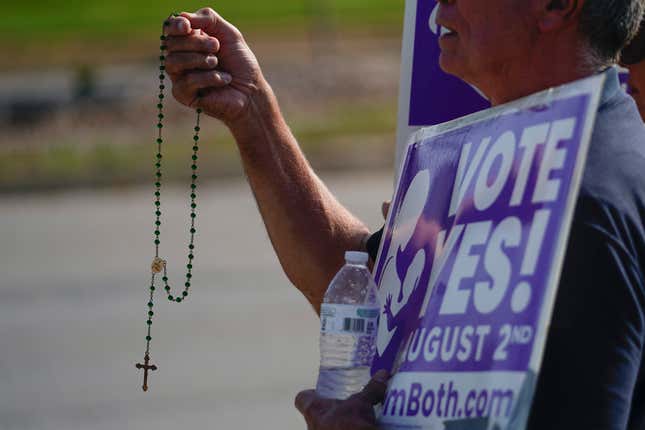Kansans May Vote Away Their Right to Abortion Today
A majority of Kansans support abortion rights, but anti-abortion activists have teed up a deliberately confusing ballot measure.
AbortionPolitics

Oft when politicians say “abortion is on the ballot,” they mean it figuratively—vote for this candidate or that, so your representatives won’t ban abortion. But on Tuesday in Kansas, abortion is literally on the primary election ballot in the form of the deceptive Value Them Both ballot measure.
The state is the first of several set to vote directly on abortion rights after the Supreme Court overturned Roe v. Wade, and Kansans will vote on whether to change the state Constitution to remove the guaranteed right to an abortion. This ballot measure alone could determine the fate of abortion access, not just in Kansas but the entire Midwest. Its ramifications could also be felt across the country, as providers in states where abortion remains legal become increasingly overwhelmed by traveling abortion patients.
The “Value Them Both” campaign—which has reportedly received more than $3 million in funding from the Catholic Church in Kansas—has thus far relied on extremely underhanded, dishonest tactics, including reportedly sending out text messages telling voters to vote “yes” on the measure to “give women a choice” and “protect women’s health.” Though other anti-abortion campaigns have disavowed these texts, this is emblematic of their greater strategy of purposefully confusing voters to win something they know they don’t have: public support.
The campaign has also consistently misrepresented itself, lying that the ballot measure merely aims to adopt “common-sense” abortion “limits,” rein in the “radical left,” and stop Kansas from becoming like “New York” or “California,” rather than what it really does: leave the door wide open for lawmakers to ban and criminalize abortion. One anti-abortion lawmaker in the state legislature already said as much at a rally for the measure last month, in which he promised to ban abortion from “conception” if the measure is successful. In other words, the endgame here is to establish fetal personhood, make women and pregnant people’s rights secondary to fetuses’, and prosecute miscarriage and abortion. If the ballot measure succeeds, Kansas’ Democratic governor Laura Kelly won’t be able to save the state from banning abortion due to the legislature’s conservative super-majority.
-

-

-

-

-

-

-

-

-

-

-

-

-

-

-

-

-

-

-

-

-

-

-

-

-

-

-

-

-

-

-

-

-

-

-

-

-

-

-

-








































